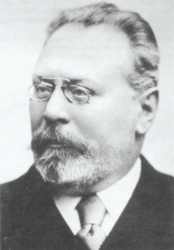Zygmunt Noskowski

Zygmunt Noskowski (2 May 1846 – 23 July 1909) was a Polish composer, conductor and teacher.
Biography
Noskowski was born in Warsaw and was originally trained at the Warsaw Conservatory studying violin and composition. A scholarship enabled him to travel to Berlin where between 1864 and 1867, he studied with Friedrich Kiel, one of Europe’s leading teachers of composition. After holding several positions abroad, Noskowski returned to Warsaw in 1880 where he remained for the rest of his life.
He worked not only as a composer, but also became a famous teacher, a prominent conductor and a journalist. He was one of the leading figures in Polish music during the late 19th century and the first decade of the 20th. He taught virtually all of the important Polish composers of the next generation, including Karol Szymanowski[1] and Grzegorz Fitelberg. See: List of music students by teacher: N to S#Zygmunt Noskowski. He served as head of the Warsaw Music Society from 1880 to 1902 and was considered Poland’s leading composer during the last decade of his life. He died in Warsaw.
While Noskowski is best known for his orchestral compositions, he composed opera, chamber music, instrumental sonatas and vocal works of importance. Discussing Nowkowski's chamber music, the famous critic and scholar Wilhelm Altmann wrote that it was "very effective and deserving of public attention and performance." Judging from the piano quartet written in 1879, one can hear that Noskowski had assimilated the recent musical developments taking place in Central Europe but the music, other than structurally, shows little or no influence of any of the major composers of the time, such as Brahms, Liszt, or Wagner, who were then dominating the scene.
Selected works
- Symphony No. 1 in A major (1874-1875)
- Morskie Oko, Concert Overture for Orchestra, Op. 19
- Symphony No. 2 in C minor,[2] "Elegiac" (1875/9)
- Polonaise élegiaque in E minor, orchestra (1885)
- The Steppe, symphonic poem, Op. 66
- March funèbre, Op. 53, orchestra (1897)
- Symphony No. 3 in F major, "From Spring to Spring" (1903)
- Symphonic Variations on Chopin's Prelude in A, Op. 28/7, subtitled "From the Life of a Nation"
- Livia Quintilla, opera (1898)
- Wyrok (The Judgment), opera
- Zemsta za mur graniczny (Revenge for the Boundary Wall), opera
- String Quartet (1875)
- Fantasy for String Quartet (1879)
- Piano Quartet in D minor, Op. 8 (1880)
Recordings
- Valentina Seferinova: Piano Works vol. 1: CD ; Impressions Op. 29; 3 Pieces Op. 35; Moments Melodiques Op. 36: Contes Op. 37; Feuille de Trefle Op. 44; - Acte Préalable AP0188.
- Four Strings Quartet: Chamber works vol. 1: CD ; String Quartets Nos. 1 & 2 Acte Préalable AP0234.
- Jolanta Sosnowska: Chamber Works vol. 3: CD ; Violin sonata in A minor, Violin miniatures Acte Préalable AP0248.
- Symphonic poem "Step" Orchestre des Champs Élysées - Philippe Herreweghe (2012 Narodowy Instytut Frederika Chopina / The Frederyk Chopin Institute.
References
- ↑ "Szymanowski Biography". Polish Music Information Center. Retrieved 10 December 2007.
- ↑ "Musique Classique Noskowski Page" (in French). Retrieved 30 March 2009.
- Wronski, Witold, Zygmunt Noskowski, Warsaw 1960
- Sutkowski, A, Zygmunt Noskowski, Kraków, 1957
- Altmann, Wilhelm, Handbuch fûr Streichquartettspieler, Heinrichshofen, Amsterdam, 1972
Some of the information on this page appears on the website of Edition Silvertrust but permission has been granted to copy, distribute and/or modify this document under the terms of the GNU Free Documentation License.
External links
- Zygmunt Noskowski Piano Quartet, Op.8 sound-bites and a short biograph
- Free scores by Zygmunt Noskowski at the International Music Score Library Project
- Concert Pianist Valentina Seferinova
| Cultural offices | ||
|---|---|---|
| Preceded by Emil Młynarski |
Music directors, Warsaw Philharmonic Orchestra 1906–1908 |
Succeeded by Henryk Melcer-Szczawiński |
|